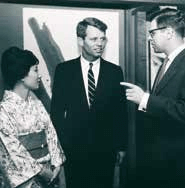Issue:

In the service of JFK
Prior to his speech, US Attorney General Robert F. Kennedy conversed with Igor Oganesoff (Wall Street Journal) and his wife at the FCCJ on Feb. 9, 1962, in front of the club’s calligraphy screen by Toko Shinoda*. Kennedy spoke at one of the few professional events held at the Club in its earlier days he was preceded in January by Israeli Foreign Minister Golda Meir and followed in May by Soviet cosmonaut Yuri Gagarin. He noted that “Japan is importing far more from our country than she is exporting to us.” Within a few years, the number of professional events at the Club increased significantly, and the US–Japan trade balance had reversed strongly in favor of Japan.
Robert Kennedy better known as “Bobby was born on Nov. 20, 1925, into a politically prominent family. It included, among his siblings, John F. “Jack” Kennedy, who became US president in 1960 and was assassinated in 1962, and Edward M. “Ted” Kennedy, who became an influential US senator in 1962 and served until his death in 2009.
Robert, following service in the US Navy (1944-1946), graduated from Harvard in 1948 with a degree in political science and briefly worked as an accredited correspondent in the Middle East for the Boston Post. But politics became his ambition, perhaps as a result of participating in his brother John’s 1946 campaign for Congress, and he entered law school in 1948. Following graduation in 1951, he again briefly served as a correspondent for the Boston Post, covering the San Francisco Peace Treaty that would bring an end to the occupation of Japan by the Allied Powers.
Later that year, Robert traveled with his brother John, then a congressman, to Israel, India, Pakistan, Vietnam and Japan, deepening a relationship that later resulted in his playing a key role in John’s successful 1960 campaign for the presidency. Appointed US Attorney General, Robert became an influential advisor to the president and expanded the power of that office to a historic high. He made a name for himself fighting organized crime, exposing corruption in the Teamsters union, supporting the civil rights movement and opposing the death penalty as well as playing a key role in the Berlin Crisis of 1961 and the Cuban missile crisis of 1962.
Following the assassination of President Kennedy in November of 1962, Robert expanded his own political base and was elected to the US Senate in 1964. As a Senator, he advocated for gun control, supported labor and minorities, pushed for human rights in foreign policy and sought to end the Vietnam war with an honorable peace agreement. He decided to run for president in 1968. While on the campaign trail in California, he was assassinated by a Palestinian, Sirhan Sirhan on June 5, 1968.
– Charles Pomeroy
editor of Foreign Correspondents in Japan,
*(See page 298 of our history book for background on the Shinoda screen, and the May, 2019 issue of Number 1 Shimbun re Shinoda screen update.)
*(See page 298 of our history book for background on the Shinoda screen, and the May, 2019 issue of Number 1 Shimbun re Shinoda screen update.)

